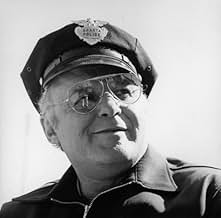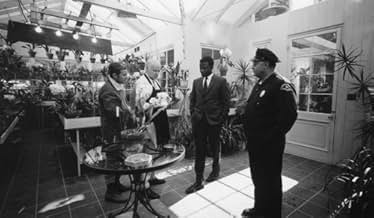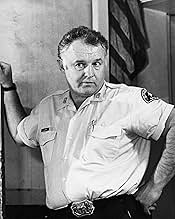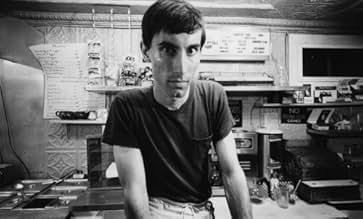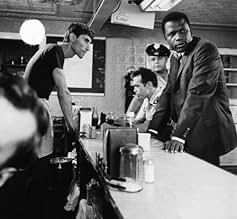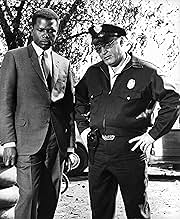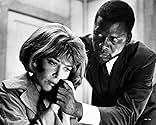Un policía afroamericano tiene que investigar el caso de un asesinato por motivos raciales en una hostil ciudad sureña.Un policía afroamericano tiene que investigar el caso de un asesinato por motivos raciales en una hostil ciudad sureña.Un policía afroamericano tiene que investigar el caso de un asesinato por motivos raciales en una hostil ciudad sureña.
- Ganó 5 premios Óscar
- 23 premios ganados y 16 nominaciones en total
William Watson
- McNeil
- (as William C. Watson)
- Dirección
- Guionistas
- Todo el elenco y el equipo
- Producción, taquilla y más en IMDbPro
Best Picture Winners by Year
Best Picture Winners by Year
See the complete list of Best Picture winners. For fun, use the "sort order" function to rank by IMDb rating and other criteria.
Argumento
¿Sabías que…?
- TriviaSidney Poitier insisted that the movie be filmed in the North because of an incident in which he and Harry Belafonte were almost killed by Ku Klux Klansmen during a visit to Mississippi. That's why Sparta, IL, was chosen for location filming. Nevertheless, the filmmakers and actors did venture briefly into Tennessee for the outdoor scenes at the cotton plantation, because there was no similar cotton plantation in Illinois that could be used. Poitier slept with a gun under his pillow during production in Tennessee. He did receive threats from local racist thugs, so the shoot was cut short and production returned to Illinois.
- ErroresThe police chase Harvey Oberst through the yellow leaves of an autumn forest, clearly indicating that it is not the middle of summer, as claimed in the movie.
- Citas
Gillespie: Virgil? That's a funny name for a nigger boy that comes from Philadelphia. What do they call you up there?
Virgil Tibbs: They call me MISTER TIBBS!
- Créditos curiososNo uppercase ("capital") letters are used in the opening and closing credits, including the film's title, cast and characters, crew and job titles, and company credits.
- Versiones alternativasThe 2001 MGM and 2002 United Artists opening fanfares and closing 2001 MGM logo originally appeared in the 2008 DVD and Blu-ray prints. But in the Criterion Blu-ray and Kino Lorber 4K release, the MGM logos were plastered with the 2012 variants.
- ConexionesFeatured in Film Review: Film Review (1967)
- Bandas sonorasIn the Heat of the Night
Music by Quincy Jones (uncredited)
Lyrics by Alan Bergman (uncredited) and Marilyn Bergman (uncredited)
Sung by Ray Charles
Opinión destacada
There are many bad "issues" movies out there, but this is not one of them. In a bad movie, all of the racist characters would be one dimensional and one hundred percent evil; here, Steiger is allowed to play a prejudiced man who is actually sympathetic and capable of growth (hence the Oscar). In a great twist, Virgil Tibbs himself is shown to be capable of prejudice, as he pursues Endicott without sufficient evidence. It's refreshing to see a movie that portrays the entire spectrum of racism, from the crazy extremists (and there are plenty of those on hand here) to the more subtly prejudiced.
"Mississippi Burning," a weaker effort, is not only more tediously didactic, but also less progressive; that film doesn't feature a protagonist like Virgil Tibbs, and instead focuses on the actions of two white federal agents. In this case, the old movie really is the better movie; produced at the height of the civil rights struggle, "In the Heat of the Night" feels more immediate and passionate than preachy films on the subject that were made years later, after the tension had died down.
Some reviewers complain that the mystery segments of the film are confusing, but I follow them without much trouble. Tibbs does a great Sherlock Holmes routine throughout, as he pieces together the solution based on clues that are also available to viewers. Sure, the ending is surprising, but it doesn't come entirely out of left field; I actually admire the subtle ways that clues are sewn throughout the film. If you're not used to mysteries, the barrage of red herrings and dead-end clues might surprise you, but it's pretty standard stuff for the genre.
I knew about the classic line "They call me Mr. Tibbs!" long before I actually saw this movie. I used to wonder why the line was so famous; it doesn't sound that exciting, does it? But when I finally heard Poitier say it in context, I asked my brother to pause the tape so I could cheer without missing any of the subsequent dialog. That's how excited I get during this movie. The performances are so naturalistic, and the racial conflict so vividly drawn, that I get pulled into the action completely. Though 1967 was a strong year for films, I still think that the right one got Best Picture, and not just because it was topical; "In the Heat of the Night" is a well-directed, superb character study, populated by some of the most vivid characters I've ever encountered in a movie.
"Mississippi Burning," a weaker effort, is not only more tediously didactic, but also less progressive; that film doesn't feature a protagonist like Virgil Tibbs, and instead focuses on the actions of two white federal agents. In this case, the old movie really is the better movie; produced at the height of the civil rights struggle, "In the Heat of the Night" feels more immediate and passionate than preachy films on the subject that were made years later, after the tension had died down.
Some reviewers complain that the mystery segments of the film are confusing, but I follow them without much trouble. Tibbs does a great Sherlock Holmes routine throughout, as he pieces together the solution based on clues that are also available to viewers. Sure, the ending is surprising, but it doesn't come entirely out of left field; I actually admire the subtle ways that clues are sewn throughout the film. If you're not used to mysteries, the barrage of red herrings and dead-end clues might surprise you, but it's pretty standard stuff for the genre.
I knew about the classic line "They call me Mr. Tibbs!" long before I actually saw this movie. I used to wonder why the line was so famous; it doesn't sound that exciting, does it? But when I finally heard Poitier say it in context, I asked my brother to pause the tape so I could cheer without missing any of the subsequent dialog. That's how excited I get during this movie. The performances are so naturalistic, and the racial conflict so vividly drawn, that I get pulled into the action completely. Though 1967 was a strong year for films, I still think that the right one got Best Picture, and not just because it was topical; "In the Heat of the Night" is a well-directed, superb character study, populated by some of the most vivid characters I've ever encountered in a movie.
- dr_foreman
- 28 mar 2004
- Enlace permanente
Selecciones populares
Inicia sesión para calificar y agrega a la lista de videos para obtener recomendaciones personalizadas
Detalles
- Fecha de lanzamiento
- País de origen
- Idioma
- También se conoce como
- In the Heat of the Night
- Locaciones de filmación
- Sparta, Illinois, Estados Unidos(Sparta, Mississippi)
- Productora
- Ver más créditos de la compañía en IMDbPro
Taquilla
- Presupuesto
- USD 2,000,000 (estimado)
- Total a nivel mundial
- USD 27,669
- Tiempo de ejecución1 hora 50 minutos
- Color
- Relación de aspecto
- 1.85 : 1
Contribuir a esta página
Sugiere una edición o agrega el contenido que falta

Principales brechas de datos
What is the Hindi language plot outline for Al calor de la noche (1967)?
Responda



